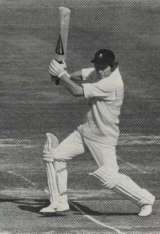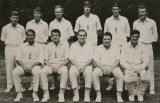
|

Alan Jones: every dog has his day
© The Cricketer
|
|
Test cricket is littered with players who have made one appearance for their country and then disappeared as quickly as they came. At the time of writing there are 377 one-Test wonders. But not included in those figures is one man who turned out for what he thought was a Test only to be stripped of his cap two years later.
In 1970, Glamorgan's Alan Jones was one of England's most prolific opening batsmen, but he was widely regarded by observers outside Wales as being too slow a scorer, and he was well down the pecking order. Nevertheless, he started 1970 in good form, and by mid-June he had made 915 runs at 48.15 and was the fourth-highest English-qualified player in the averages.
The 1970 summer was due to have seen England play a five-Test series against South Africa, but that was eventually called off on May 22, less than a fortnight before it was due to start, after a barrage of public protests made it clear that the tour could never have gone ahead.
Faced with a summer of no major international matches and resulting massive financial losses, the Test & County Cricket Board (the fore-runner of the ECB) hastily arranged a series against a Rest of the World side which, ironically, included several of the South Africans who would have toured anyway. Guinness were drafted in as series sponsor, and Garry Sobers agreed to lead the World XI on the condition that the five games were given Test status. The TCCB agreed ,and the matches were marketed and sold as Tests and referred to as such throughout the media, even though many reporters were uneasy with how seriously the games would be played.
The series kicked off at Lord's on June 17. The game was unusual in that it started on a Wednesday as the following day there was a general election in the UK. As a result, the Thursday was a rest day and match resumed on the Friday.
The England side, especially the batting, was weak. Geoff Boycott and Colin Cowdrey asked to be left out as both were in poor form, while John Edrich, the senior remaining batsman, pulled out with a hand injury. "England have seldom been represented by a duller side," wrote John Woodcock in The Times, but the lack of openers gave Jones, 32, his chance.
"I remember that when news of my selection for the first game of the series was announced, Glamorgan were playing Essex at Chelmsford," Jones recalled. "After hearing the news, Keith Fletcher came up and congratulated me, saying that my selection was not before time."
The first day of the match was overcast and humid - ideal swing-bowlers' conditions - and there was a hint of dampness in the pitch. Ray Illingworth won the toss and chose to bat. It was a brave decision given the weakness of England's batting.

|

The England XI that never was
© The Cricketer
|
|
"I was so proud when Illingworth presented me with my England cap, blazer and sweaters," ones said. "My Glamorgan colleagues were very pleased as well, as were many other county players."
Jones faced the first ball of the match, from Graham McKenzie - he slashed at a wide one and it flew over the slips and raced to the boundary. "Jones, given an overdue chance after years of consistent scoring in county cricket, seemed overcome by the occasion," Wisden noted. The following over he "played a rash stroke to Procter's fast delivery and lost his wicket". He trudged off having made 5. Jones himself admitted it was a "rash, appalling stroke".
He wasn't the only failure, however. At lunch England were 44 for 7, and only a spirited 63 from Illingworth helped them crawl to 127.
The World XI piled on the agony by amassing 546, and when England batted again, 419 in arrears, Jones fell in identical fashion for 0. England went on to lose by an innings and 80 runs with a day to spare.
Jones denied he had frozen on the big stage. "I simply had a bad game. Every player is entitled to a few of those ... my misfortune is that my bad game happened to coincide with the biggest match of my career."
By the time the selectors sat down to pick the side for the second Test, Boycott and Cowdrey had made themselves available, Edrich was fit and Brian Luckhurst, who had opened the innings with Jones at Lord's and who was also making his debut, did enough to retain his place.
Jones was not called to tell him he was out. "I had a few days off and popped off to the beach with my wife," he reflected. "We were both sunbathing and listening to the radio when the newscaster announced the England 12 for the next Test at Trent Bridge. I waited anxiously to hear A Jones of Glamorgan ... but the precious words never came. Having worked so hard, it was a hell of a blow."
At their annual meeting in July 1972, the ICC confirmed that the Rest of the World matches would not be considered official Tests, and this was confirmed by the TCCB a year later. It took Wisden another seven years before they reluctantly removed the five matches from their Test records.
Yet Jones never heard officially about the game being stripped of Test status. "I read about it in a few newspapers, " he said. But although it has been widely reported that the TCCB asked Jones to return his England kit, he denied that was the case. "I was never contacted formally and still have the cap, blazer and jumpers."
John Arlott, at the time of Jones's retirement in 1984, summed it up perfectly. "It is a savage irony that his only selection for England was in the massive con trick - as cynical as any ever pulled in cricket."
In 2005, the ICC gave official Test status to a match between Australia (at the time the No.1 ranked country in the world) and a World XI at Sydney in October of that year. That caused much debate, with the ICC accused of using its position to give status to the game to help attract sponsors. The first Test of all time, between England and Australia in March 1877 was not billed as such at the time. The original game was Melbourne and Sydney versus James Lillywhite's XI, as the tour was a private one and not shown as a representative England XI. It was only recognised as a Test some years later.Is there an incident from the past you would like to know more about? E-mail us with your comments and suggestions. Bibliography
The Cricketer 1970
Wisden Cricketers' Almanack Various
Hooked On Opening Alan Jones (Gomer Press 1984)
Martin Williamson is managing editor of Cricinfo

